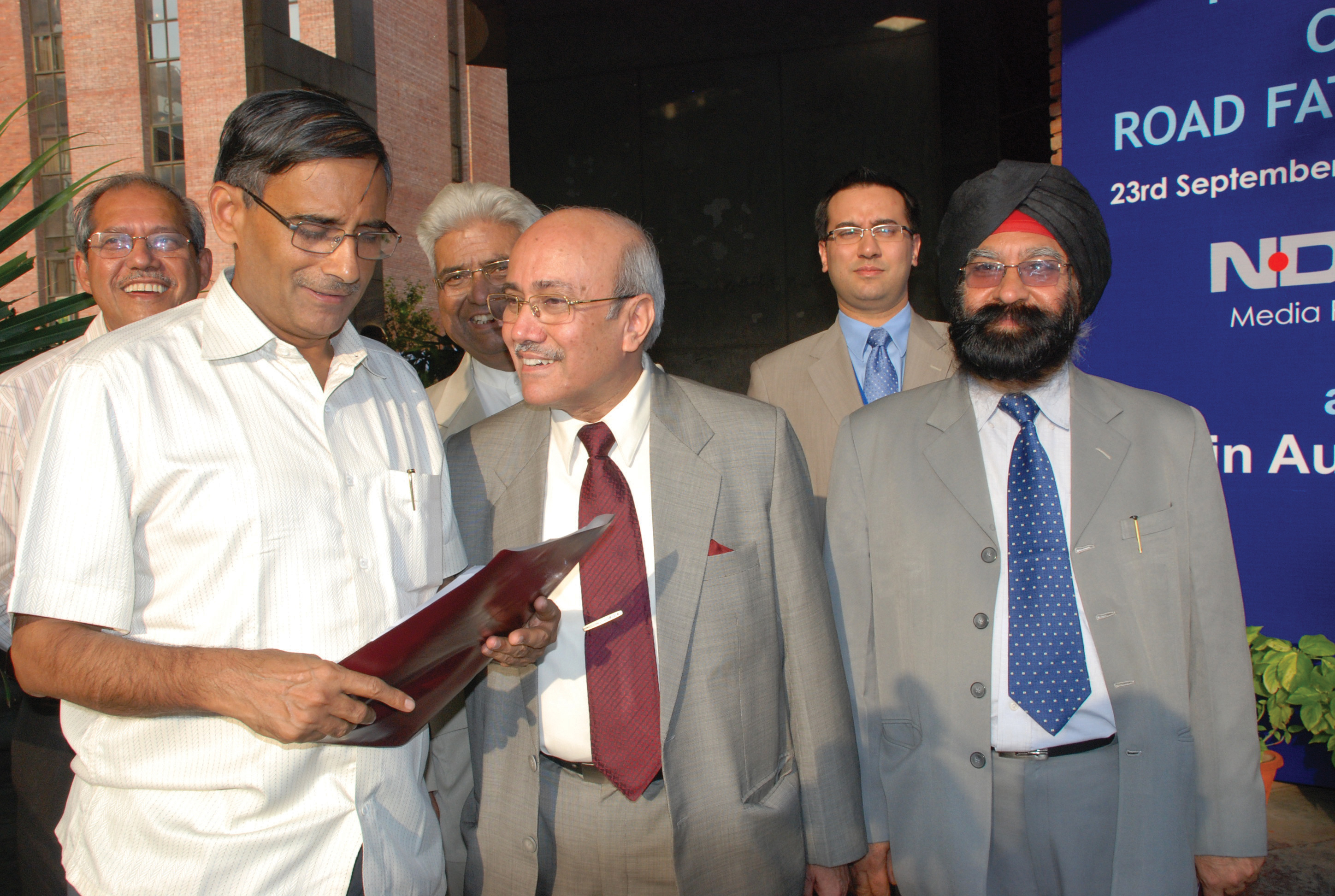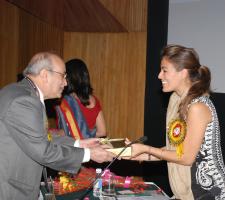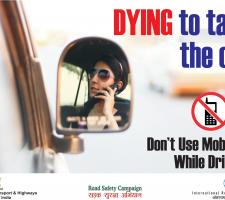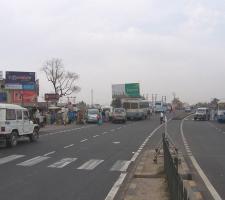
Mr. K. K. Kapila (centre) receiving Mr. Brahm Dutt and Mr. Nirmal Jit Singh at the launch of the National Campaign.
Introducing an Indian business leader committed to combating the 'perfect plague' of deaths on the country's roads
Kiran Kapila, the new Chairman of"We would like to reduce road fatalities in India by 50%, by 2012," explains Mr. Kapila. "The current figure for the country is 125,000 deaths a year - that's the equivalent of one Jumbo jet crashing every day, with no survivors! The magnitude of the problem is not properly understood, and the media doesn't give the problem sufficient importance." To bring home his point, Mr. Kapila immediately provides some stark perspective - not only in terms of human, but also economic loss: "A study commissioned in 1999/2000 projected that the social economic cost of accidents on India's roads amounted to some 3% of GDP. This represents Rs. 55,000 crores. If I tell you that five crores of rupees are roughly equivalent to US$1 million, you will see that the figures are mind-boggling. Given the steady increase in accidents since that report was published, the amount is now probably closer to Rs. 75,000 crores. That's more than the total annual budget of some nations!"
"A multi-faceted approach is essential," he emphasises. "It requires a totally-coordinated action plan involving all agencies and stakeholders at every phase - from road conception to operation. We are working to make this possible. For example, the Government is actively considering a proposal for creating National and State level Road Safety Boards. The Campaign and advocacy of IRF India is for a total solution."
Whilst ambitious and far-reaching, the campaign is nevertheless pragmatic. "We are not talking about impossible dreams. Rather, we are aiming for practical solutions that can be implemented immediately. By way of simple instance, we are working with the Ministry of Heavy Industries to change the colour of every bicycle produced in India from black to reflective orange. Similarly, we are recommending through the various manufacturers that, henceforth, the rear mudguards of all motorised two wheelers should be painted in fluorescent orange. This single action could immediately and significantly help reduce road fatalities. In this context, driving skills and enforcement are particularly key. To address these dimensions, we are urgently increasing the number of driving schools throughout the country, and introducing driving simulators so that trainees receive proper instruction before being let loose on already clogged and dangerous roads."
On a technical level, the campaign benefits from the expertise of one of India's leading academics in the field of road safety, Professor P. K. Sikdar, a former Director of the
"Most road accidents in the country are the result of a mismatch between the vehicles, users and road environment," he explains. "Often it is stated that 95% of all accidents are the fault of the users. This is not entirely correct. More accurately, they can be attributed to shortcomings in the factors that control the road users' performance, such as driver skills, training and licensing, education and enforcement. 54% of all road fatalities across the country involve the most vulnerable road users, like cyclists and pedestrians. In major cities like Delhi, the figure can be as high as 75-90% "An incompetent driver in a traffic stream is a serious hazard, not only for himself but also for others. This emphasises the need for a multi-pronged approach of the kind we have adopted. The problems cannot be underestimated."
To illustrate, Professor Sidkar presented some of the slides and figures quoted at the launch of the Campaign. These demonstrated that India currently had the dubious distinction of recording the highest number of deaths from road accidents in the world - accounting for 10% of all annual global fatalities - and brought home graphically the tragic extent of, what he terms, the "silent disaster" that causes the "burden of death, disability and despair on more than 100,000 families each year."
"This plague is slipping under the radar," echoes Mr. Kapila. "That is why we have engaged a prominent media partner to help us focus attention on the extent and gravity of the situation."
With the guidance and support of the media partner in question, NDTV, the campaign has deployed a high-profile national advertising and awareness strategy.
This has been translated into all major national languages, and notably includes daily insertions in some 130 leading newspapers, complemented by a set of campaign posters featuring catchy slogans, and a series of TV promotional shorts on key road safety themes. Once again, the outreach is both imaginative and comprehensive.
For example, efforts are currently underway, in consultation with the Ministry of Information & Broadcasting, to make it mandatory for all cinema and multiplex owners to screen road safety shorts before the start of the main feature - thereby mobilising even the popular power and influence of Bollywood!
The comprehensive nature of the package of what Mr. Kapila terms "vaccine" measures to fight road accidents reaching "epidemic" proportions bears fine testimony to the capacity and massive potential of the business sector to bring about positive change for good, when truly committed to acting as responsible global corporate citizens.
The IRF India Chapter website (www.indiairf.com) features a plethora of imaginative, attractive but effective tools to promote road safety among all ages and categories of road users - from jigsaws, car stickers, poster slogans and games to a whole arsenal of modern awareness tools, including links to Facebook, Twitter and a comprehensive series of professional videos on YouTube.
The popular educational component is complemented by a comprehensive set of detailed recommendations, including many that are already well advanced in terms of implementation. These clearly demonstrate that the campaign is not merely limited to awareness activities. It is also committed - to quote just a few examples from a long list - to amending the Motor Vehicle Act in order to provide for more stringent driver licensing provisions as well as stricter laws against speeding, drink driving and other road abuses; to ensuring, with support from the Ministry of Industry, the inclusion of on-board safety devices in all new vehicles; and to organising the training, in collaboration with the Home Ministry, of dedicated traffic police.
The business approach adopted by the campaign means that all the recommendations are viably grounded in reality, and that concrete strategies are in place to enable their actual achievement on a practical level. For example, a proposal has been framed for the Government of India to initiate Driver Training Schools in thousands of existing polytechnics and Industrial Training Institutes throughout the country, with two States already earmarked to pilot the programme.
Similarly, plans are well advanced for establishing a network of some 20 to 25 schools for the training of expert driving instructors, as well as specialist road safety training research centres, on the basis of initial Government funding backed up by Public-Private Partnerships.
On another level, a series of five-day certification courses for Road Safety Auditors is currently underway in collaboration with ARRB, an IRF member, aimed at training 200 specialists during 2010 alone.
To echo one of the slogans on the campaign website, 'Road Safety is No Accident'. Rather it clearly depends on a whole lot of hard work and dedication by committed individuals like Mr. Kapila and his exceptional team.
The above article is based on edited extracts from an extended interview with Mr. Kapila, which is featured in full on our website,









